International Conference, Beijing University October 25-27, 2018
Qian Zhongshu’s Foreign Language Notes
Chop Suey and Tablets of Memory
by Monika Motsch
 Druckerfreundliche Version/ printer-friendly version
Druckerfreundliche Version/ printer-friendly version
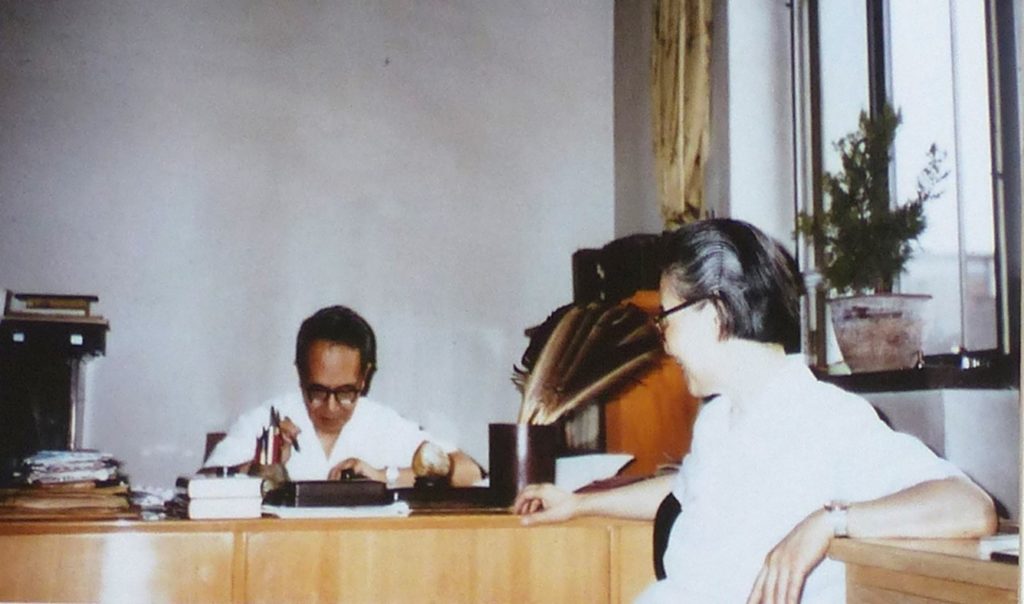
Figure 1: Qian Zhongshu
Qian Zhongshu’s (Figure 1) Foreign Language Notes have recently been published in Beijing [1]
In my eyes, Qian’s Notes are a World Wonder like the Chinese Great Wall. But while the Great Wall had been built to protect China from the invasion of the barbarians, the Notes are like a „Great Bridge“ connecting China with the world.
Publication of the Foreign Language Notes
During 2012, 2013 and 2014 my husband Richard and I were helping the Shangwu Publishing House with the edition of the Notes. The driving force behind this huge project was Qian’s wife Yang Jiang 杨绛 (Figure 2). Without her and her energetic friend and biographer Mrs. Wu Xuezhao吴学昭, (Figure 3) the edition of the Foreign Language Notes would have been impossible. Each year we worked several months in the archives of Tsinghua University, where the originals of the Notes are kept, and also at home in Germany with our computers. For us this was an unforgettable experience, full of surprises, occasional setbacks, and final happy end. (Figure 4)

Figure 2: Yang Jiang 杨绛 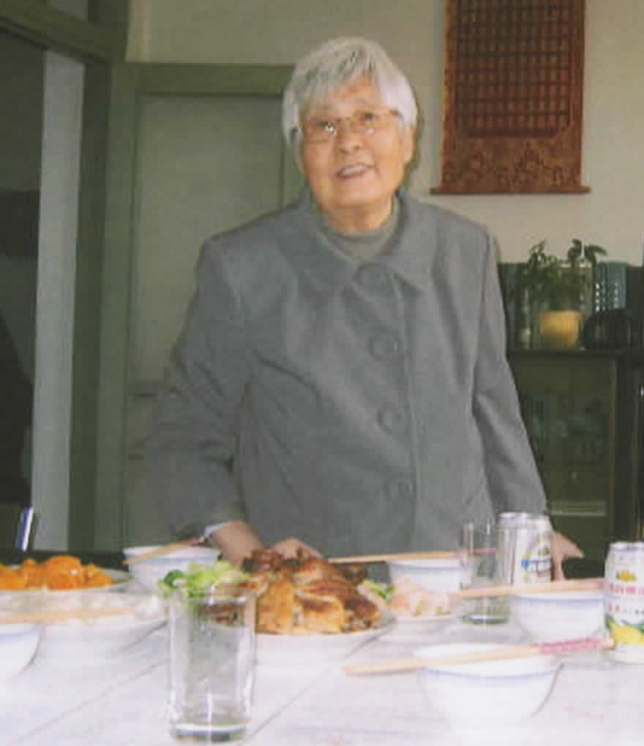
Figure 3: Wu Xuezhao 吴学昭
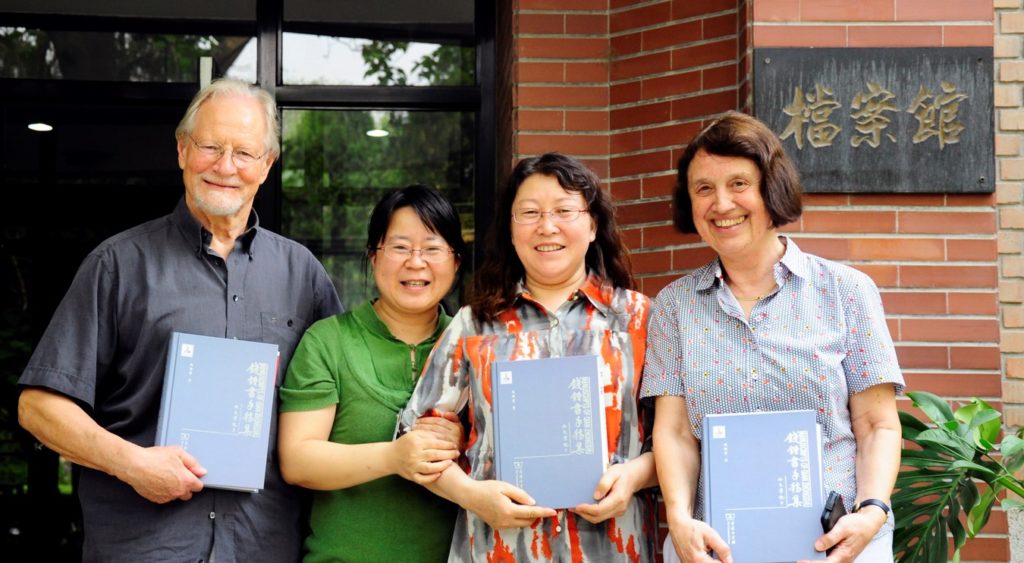
Figure 4: Monika and Richard Motsch with the director of Tsinghua University Archives and Chen Jie 陈洁, editor of Shangwu Publishing House
1999, after Yang had lost her only daughter and her husband, she was close to a physical and mental breakdown. Her great fear was, that when she was gone, the Notes would be scattered or destroyed. At that time, she asked me for help and showed me the Notes for the first time. They were kept in large boxes in Mrs. Yang’s flat, thousands and ten thousands of pages with extracts of Western literature. They were partly notebooks, partly bundles of loose papers, which had been put into folders. Many of them had been handwritten, others had been typed by Qian himself.
1999, after Yang had lost her only daughter and her husband, she was close to a physical and mental breakdown. Her great fear was, that when she was gone, the Notes would be scattered or destroyed. At that time, she asked me for help and showed me the Notes for the first time. They were kept in large boxes in Mrs. Yang’s flat, thousands and ten thousands of pages with extracts of Western literature. They were partly notebooks, partly bundles of loose papers, which had been put into folders. Many of them had been handwritten, others had been typed by Qian himself.
Mrs. Yang thought, the very best way to protect and save the Notes would be to publish them, but that would take time. So, I offered to make a preliminary inventory of the titles of the excerpted texts. During the summer holidays of 1999 and 2000, I typed a „table of contents“ for each of the 211 notebooks and folders. But since I had only two months‘ time, this was a rather hurried affair. I had no time to arrange the texts in any chronological or factual order. This chance came 12 years later, when Shangwu published the Chinese and Western Manuscripts of Qian Zhongshu.
The Notes are an inseparable part of Qian’s life. Starting 1936, while Qian and Yang studied in Oxford, they accompanied him everywhere, to Paris, Shanghai and Beijing. During the Cultural Revolution they were secretly smuggled into the Cadre Schools, where they went from hand to hand and were a comfort for many friends and colleagues. Then the Notes returned to Beijing, first to the very cramped room, where Qian was writing his Guanzhuibian 管锥编and where Yang Jiang was translating Don Qixote. Still later they went to their flat in Beijing, Sanlihe and finally to the archives of Tsinghua University.
The Notes are written in seven languages, mainly in English, but also in French, German, Italian, Spanish and even in Latin and Greek. With his excerpts Qian usually started with the classics: For instance, in England with Chaucer and Shakespeare, in France with Rabelais and Montaigne, in Italy with Dante and Boccaccio, in Germany with Meister Eckart and Goethe. From these beginnings, Qian worked his way through the centuries till the present time. Besides literature and literary criticism, he treated a wide range of subjects. He was interested in practically everything, philosophy, psychology, linguistics, anthropology, detective stories, jokes, erotic stories, plays on words.
Qian had planned to write in English a great comprehensive work about Western Literature, and the Notes were to be his library. But later, The Academy of Social Sciences transferred Qian from the „Department of Western Languages“, for which he was qualified by his education, to the „Department of Classical Chinese“. As Yang Jiang has told us, this was a very great disappointment for Qian. His plan to write a work about Western Literature became impossible. The Notes were now useless for him, at least as far as this favorite project was concerned.
But are they also useless for us? Could they not be a very valuable legacy for us and later generations? Of course, times have changed, and we might wonder, whether handwritten or hand-typed Notes are not a bit outdated in this digital era. Is it not a lot easier now, to get downloads from the internet? As a matter of fact, an „Online Edition“ of the Notes would be very desirable. It would be easier to read and attract a greater public. But before this „Online Edition“ appears, the existing paper form also offers many interesting possibilities.
Treasure Chest for Qian Zhongshu Studies
Qian has used the Notes during his whole life as a reference material for his creative and scholarly works. They contain material used in his novel Weicheng and in his essays, in Tanyilu as well as in Guanzhuibian. Since the published edition of the Foreign Language Notes contains an index apparatus of authors and titles, these connections are now easily accessible.
To give one example (Figure 5): In Notebook 2, written 1936 in Exeter College, we find an old German poem: „Du bist mîn, ich bin dîn,/Des solt du gewis sîn./Du bist beslozzen/In mînem herzen./Verlorn ist daz sluzzelîn/ Du muost immer darinne sîn“ (You are mine, I am yours/ that you can be sure of/ You are locked into my heart/ Lost is the little key/ you must be always inside) [2]
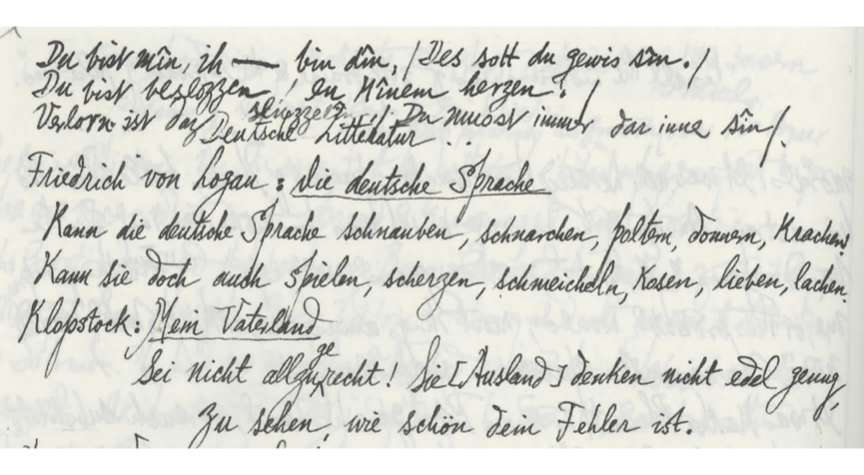
Figure 5: Old German Poem
The poem, written at the end of the 12th century, is supposed to be the oldest love song in Middle High German. In Weicheng (Ch. 3), Qian has invented a whole story around this poem: During a social gathering, the elegant Miss Su shows the guests a beautiful Chinese fan, on which a Chinese variation of the poem is written. Fang Hongjian, inexperienced and tactless, immediately declares the work to be a plagiarism, realizing too late, that it was composed by Miss Su herself. Fang finds a clever excuse for his mistake, but this leads later to a rather embarrassing erotic involvement.
The Notes contain many Western sources of Guanzhuibian. Guan treats the canon of Chinese literature in the mirror of Western literature, with many references to European and American literature. The sources can be discovered in the Notes, together with the context as well as similar or contrasting material. One can compare Qian’s excerpts with the originals, finding out what he chose and what he left out, what editions he used etc.
The Notes can also be studied as an independent work. Qian has often treated Western authors, which are very difficult to read, even for Europeans in their own language, for instance German philosophers like Immanuel Kant, Georg Friedrich Hegel, Edmund Husserl and Martin Heidegger. Qian has done long excerpts from linguistic or psychological treatises, and even from huge dictionaries. French or Greek accents or signs of praise on the margin show, that he read them again and again.
Qian has even compared editions of the same author in different languages. Thus, he has put a German and an English edition of the diaries of the German author Kafka side by side, very much to the disadvantage of the German work: In one of his very rare comments Qian writes: „A prudish edition. Coarse passages in the English translation are omitted in the German text.“ (Figure 6)

Figure 6: German and English Edition of Kafka put side by side 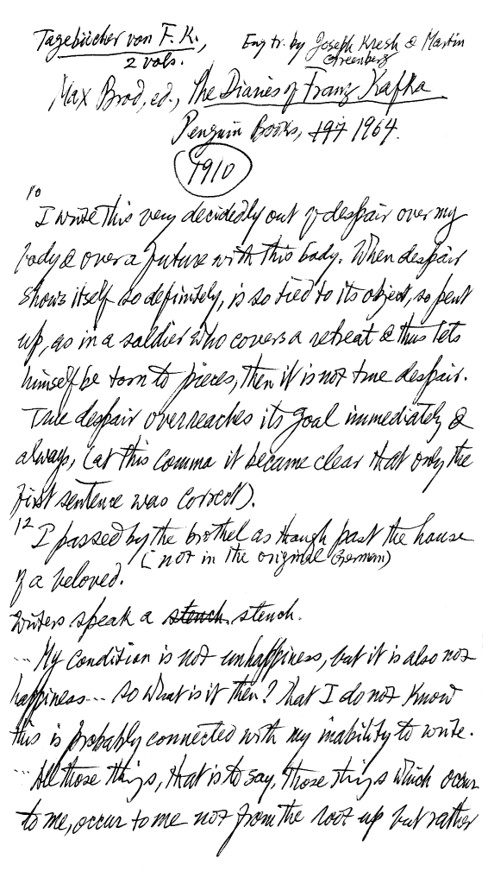
Even though the Notes are the result of intensive research and learning, yet they are never dry and academic. In his excerpts Qian often catches the creative process, the ingenious, stimulating phrase, often surprising and sometimes rather funny and amusing.
Insights into Qian’s Life and Times
The Notes can be studied as a mirror of Qian’s time and personal experiences. Yet his excerpts are never only personal, they rather contain general truths, insights into life and social intercourse, which are also true today. Thus, it happens, that in Qian‘s quotes we can often recognize ourselves. The ups and downs of academic life are discussed from different angles. Some are rather ironic, i.e. a bon mot about book writing: Since the author himself has only spent 9 months in the womb, I do not see, why a book should sit on the writing desk for 9 years [3].
Help is given, if people are afraid of making public speeches: If anyone is beset by stage-fright and breaks down in a speech he has but to imagine he is a listener and he will complete the sentence with ease. If he is being examined let him pretend that the questions are addressed to another and he will feel the superiority of the spectator and moreover prove it [4].
Being obliged to listen to the boring speeches of others, is certainly a problem, but there is a possible remedy: The older I become, the more do I dislike speeches. I was sitting on a platform some time ago with a fellow … In the course of the proceedings he was observed to seize a pencil and a sheet of paper and to write with frenzied concentration … the note contained the following sentence: „It has become a physical agony to me to listen to speeches other than my own“. In Holland nobody ever made a speech straight off. There was always an interval of 15 minutes in the middle, during which the audience walked about outside, sipped coffee, smoked cigarettes and asked the speaker for his autograph.[5]
For successful social intercourse, a clever piece of advice is given. When the famous French writer Bernard le Bovier de Fontenelle (1657- 1757) was asked, why he had only friends and no enemy, he answered: Par ces deux axiomes: tout est possible e tout le monde a raison“.[6] (With these two axioms: „all is possible“ and „everybody is right“)
In other excerpts, the tone is grim and foreboding, creating a threatening atmosphere: The growing temptation to the State to control the channels of publicity. One of the tyrants of antiquity is said to have wished that people had a single neck. It would render decapitation so much easier.[7]
Intelligent advice is given, how to protect oneself in dangerous times, for instance in this gruesome story: WISDOM. Wise men say nothing in dangerous times. The lion, you know, called the sheep to ask her if his breath smelt; she said „Aye“; he bit off her head for a fool. He called the wolf and asked him: he said „No“; he tore him in pieces for a flatterer. At last he called the fox and asked him: truly he had got a cold and could not smell.[8]
Relief can always be found in humour. Qian has excerpted a great many joke books, mainly in English, which he often quotes with gusto, for instance this one: A man found his own name in the obituary column of his newspaper. As he was clearly NOT dead, he went to the paper’s editor to correct it. The editor replied: „First, we NEVER make mistakes, and second, it is against our policy to publish corrections! But I have the perfect solution to your problem: we can put your name in our newest list of BIRTH announcement!“
There is advice given on how to deal discreetly with troublesome neighbors: Little Georgie received a drum for Xmas, and shortly thereafter, when father came home one evening, mother said: „I don’t think that man upstairs likes Georgie to play his drum, but he is certainly subtle about it.“ „How?“ This afternoon he gave Georgie a knife and asked him if he knew what was inside the drum.“[9]
Finally, a moving example for an inscription on an epitaph for a very beloved friend: Send us to Hell or Heaven or where you will,/Promise us only you’ll be with us still:/Without you, Heaven would be too dull to bear, /And Hell will not be Hell if you are there.
Calligraphy and Drawings
The Notes are not only learned, they are also a work of art and can be enjoyed as such. Qian Zhongshu is famous for his beautiful Chinese calligraphy. The amazing thing is, that he displays this talent also in the very different medium of Western handwriting. Instead of Chinese ink and writing brush, he uses fountain pen, ballpoint pen and typewriter. Instead of Chinese characters he writes the letters of the Western alphabet, and he does this with great artistry. Let us look at some examples: On the title page of the first notebook , Chinese and Western characters are put side by side (Figure 7): First in Western script: „Hours in the Bodleian, written by Chongshu Chien, Exeter College, 1936“. Then follows a text in Chinese calligraphy, telling us in classic Chinese that Qian Zhongshu and Yang Jiang went every other day to the Oxford Bodleian Library to make excerpts [10]. The same with the title of Notebook 2, Chinese and Western script are put side by side (Figure 8): A classic Chinese poem sings the praises of making excerpts [11], contrasted by a classic Latin line: „Nulla dies sine linea. Qui scribit bis legit“ (No day without writing a line. Who writes reads twice.)

Figure 7: Title page of the first notebook 
Figure 8: Title page of the second Notebook
After this Chinese –Western beginning all is written in Western script. Reading Qian’s handwriting is a fascinating experience. Richard Motsch (Figure 9) has described it thus:

Figure 9: Richard Motsch
Qian’s handwriting captivates us by its beautiful, dynamic and clear strokes. It attracts and even entices the reader. These are not some scholarly or shorthand notes, attempting only to be fast and effective. Even when the pages are filled to the utmost with small script, each letter is shaped perfectly. (Figure 10) Especially in the early works, the upper and lower parts of the capital initials are extended in grand, sweeping strokes (Figure 11) On a stray page there are English and French phrases beautifully arranged side by side with Chinese characters (Figure 12). Naturally the writing changes in the course of years. Illness leaves its mark. (Figure 13) After the mid-sixties of the 20th century the writer uses a ballpoint instead of a fountain pen. It is truly amazing how few mistakes (and corresponding corrections) Qian made. He was multilingual. He almost always read and wrote in the original language. And this makes the perfection of his notes even more astonishing. The typescripts are just as impressive. With their low number of mistakes, which is all the more remarkable since Qian typed with only two fingers. There is one stray page typed even by Yang Jiang (Figure 14). But generally Qian typed his texts by himself. Handwritten expressive hooks, corrections of French accents show that Qian constantly went over his notes and revised them (Figure 15) . Remarkable are his rare drawings showing a keen observation, a precise stroke, and an interest in all kinds of wild and fantastic situations.[12]

Figure 10: The pages are filled to the utmost with small script
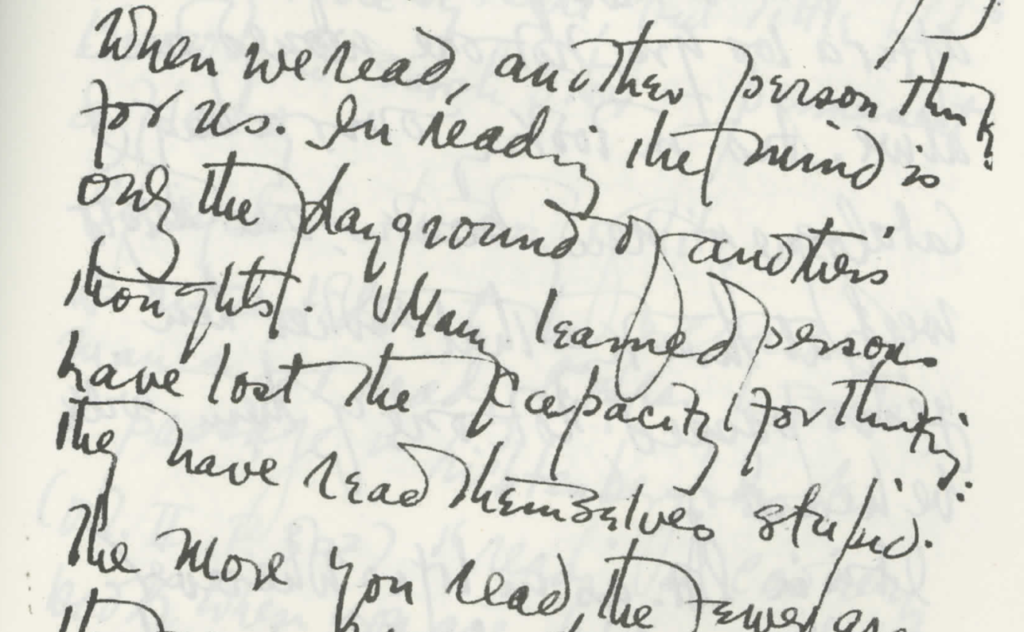
Figure 11: The upper and lower parts of the capital initials are extended in grand, sweeping strokes

Figure 12: English and French phrases are beautifully arranged side by side with Chinese characters

Figure 13: The writing changes in the course of years. Illness leaves its mark
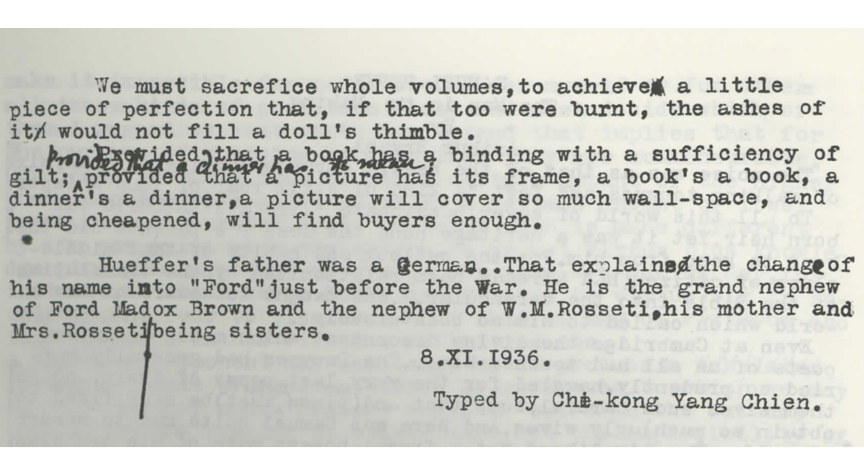
Figure 14: Page typed by Yang Jiang
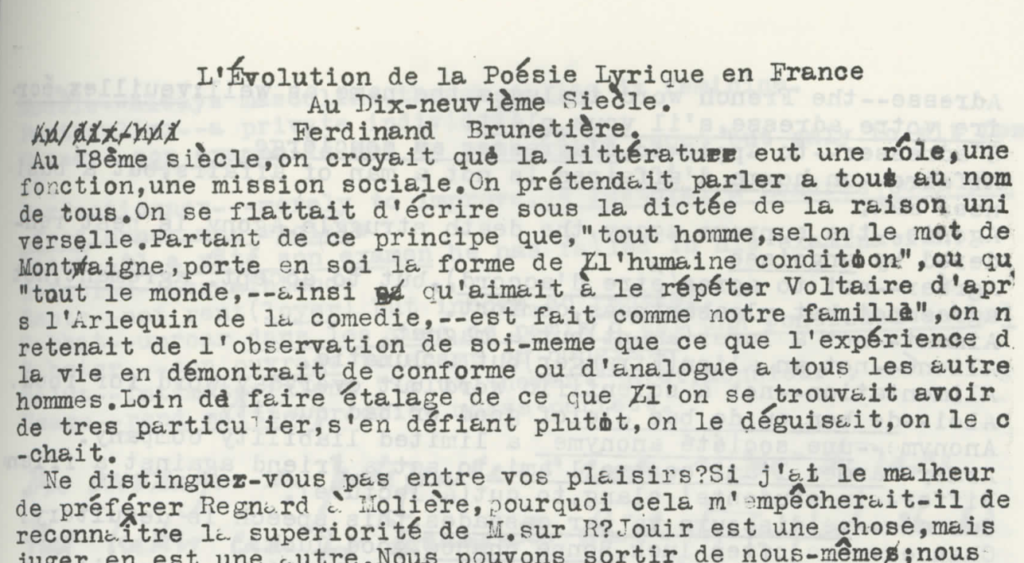
Figure 15: Handwritten expressive hooks and corrections of French accents
There are drawings of monstrous little animals with the theme: „Young vipers eating their way through the parent body“ and „The panther attracting animals by the sweetness of its breath“, as well as basilisks and cockatrice (Figure 16) . There are expressive portraits of men, drawn with only a few strokes, for instance one portrait, where we might wonder, whether it could be a self-portrait of Qian himself; (Figure 17). There is a splendid drawing of a woman who extinguishes a candle with a fart (Figure 18). With his typewriter Qian has produced witty plays on words: If you delete one stroke from the word EAT, there appears the result of EAT, which is FAT (Figure 19). While excerpting one of his beloved English detective stories, Qian has playfully inserted in Greek letters the words τέλειος κλέφτης, which means «clever thief» (Figure 20).

Figure 16: Drawings of monstrous little animals

Figure 17: Expressive portraits of men, drawn with only a few strokes 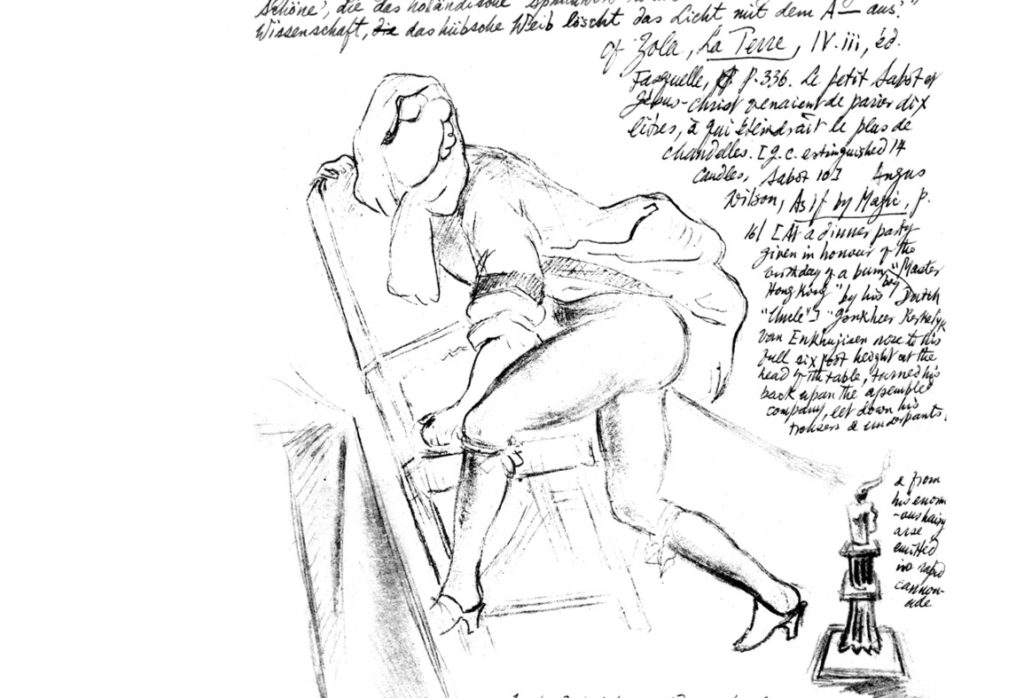
Figure 18: Drawing of a woman who extinguishes a candle with a fart
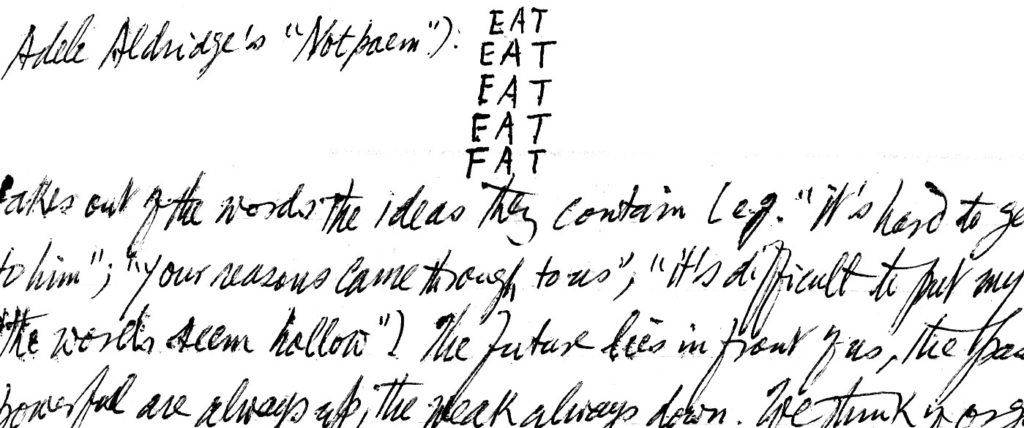
Figure 19: Play on words 
Figure 20: τέλειος κλέφτης, (clever thief)
Qian Zhongshu’s Art of Quotation
The art of copying is an old tradition in China and in the West, but especially so in China, and Qian Zhongshu was a master of this art. But there are striking differences: First, Qian quotes in seven foreign languages. Second, he does not mix his quotes with his own comments. Montaigne’s Essais, Richard Burton’s Anatomy of Melancholy, Arthur Schopenhauer‘s Parerga and Paralipomena are famous for their wealth of quotations; yet these are often integrated with the own ideas of the authors. But Qian Zhongshu, apart from the very early notebooks, has avoided mixing up his extracts with reflections of his own. Why has he done this?
When many years ago I first saw the Notes, I remember, that I did not think them so very fascinating: After all they were authors and texts, with which I had grown up and had been familiar with for many years. Would it not be better to read the originals, instead of reading excerpts? Yet later I was amazed: I often found quotations, which were chosen so ingeniously that I saw the old texts with new eyes. Besides I discovered innumerable new texts, I had never come across before. Has Qian maybe developed his own art of quotation? And what could be the secret behind it?
Thackeray
To find out more about Qian’s strategies of selection, let us look at a few examples. First, some excerpts from a book about W. M. Thackeray, the author of Vanity Fair, written by Lewis Melville (1874 – 1932). Qian has chosen four different remarks by Thackeray. By putting them together he gives them a new meaning:
- Vanity, and envy are the vocational diseases of writers.
- When Vanity Fair was appearing serially: Gerrold hates me, Ainsworth hates me, Dickens distrusts me.
- I met on the pier the great Dickens with his wife, his children, his Miss Hogarth, all looking admirably coarse, vulgar and happy.
- One of Dickens’ immense superiorities over me is the great fecundity of his imagination. [13]
In no. 1 and no. 2 Thackeray notes, that „vanity“ and „envy“ – the main themes of his famous novel – apply also to the writer community, including his great rival Dickens. The third quote hints that they also apply to Thackeray himself: This is shown by his condescending description of the Dickens family and also by the fact mentioned in a foregoing paragraph, that Thackeray was a bachelor and was possibly looking with envy at Dickens’s big and thriving family. But the fourth remark gives the theme a surprising turn, showing a generous appreciation of Dickens, which makes us see Thackeray in a much more favorable light. Thus, with a few strokes, Qian paints a lively and many-sided portrait of the English artist.
A.W. Kinglake: Eothen
Qian has often arranged his quotes in way that they create new contexts and meanings. This is the case with the oriental travel account Eothen (1844), written by the English lawyer and writer A. W. Kinglake. The book describes Kinglake’s journey to Syria, Palestine and Egypt and was very popular in his time. The original version of Eothen is available as a reprint [14]. In his excerpts Qian has left out detailed accounts of Oriental cities or meetings with the British community living there. He is mainly interested in the experiences of the English traveller Kinglake, who comes into contact with the strange culture of the Orient.
6Qian has excerpted Eothen twice. „Excerpt Eothen 1“ describes, how Kinglake travels with his party of Arab servants through many Oriental countries [15]. Learned, shocking and amusing excerpts are put side by side creating interesting contrasts. There is for instance a description of the „international atmosphere“ in the town Tiberias in Galilee: The fleas of all nations were there and all rejoiced in the great international feast. After passing a night like this, you are glad to pick up the wretched remains of your body long before morning dawns. In Weicheng Qian has used this episode, when Fang Hongjian spends a night in a shabby hotel in the Chinese hinterland: Apparently the Montmartre Flea-Market and the Olympic Lice-Games were simultaneously held in the „Grandhotel Eurasia“. He was bitten all over and his fingers were limp from his fruitless attempts to catch them. (Weicheng, Ch. 5) [16].
There follows a conversation between Kinglake and the important person of the Pasha, which takes place with the help of an Arab translator. While the Pasha uses a flowery style with beautiful exaggerated compliments, the traveller answers in plain English. The Arab translator tries to adapt to both speakers, with rather hilarious results. In Constantinople the English traveller has a dramatic encounter with an Ottoman lady. First, she is nearly invisible, because face and body are completely covered with white linen. But suddenly she lifts her veil and looks at him with her dark luminous eyes, enjoying his confusion and giddiness. A moment later she unexpectedly touches his arm and scares him with a Turkish curse: „Here is a present of the Plague for you!“. Then she laughs and leaves him triumphantly.
The highlight of Qian’s „Eothen 1“ is a meeting with a group of lively young girls in Bethlehem. Fascinated by the stranger, they cautiously draw closer and closer, happy and excited by their adventure, but also afraid that the stranger might be dangerous. Then their little leader dares to touch the stranger’s hand, and the others follow. When the most timid and most beautiful girl does not dare to do this, her companions, with great glee, finally force her hand into his. There follows a long exhausting walk in the burning sun, a comfortable rest in a tent and the departure the next morning.
The second version, „Eothen 2“, has about twice the length [17] . It is better documented, listing the publishing firm and the numbers of chapters and pages. But that is not all. By cutting out passages and adding others, Qian has made the story much more impressive. The somewhat disjointed beginning is deleted. All the highlights of the journey are kept, but the episode with the young girls is given more space. When the timid, beautiful girl is finally forced by the others to touch the English traveller‘s hand, an added quote gives the passage an erotic touch and makes the encounter with the stranger more dramatic: … and marry her hand to yours. The quick pulse springs from her fingers and throbs like a whisper upon your listening palms. For an instant her large timid eyes are upon you … in an instant they are shrouded again, and there comes a blush so burning, that the frightened girls stay their shrill laughter as though they had played too perilously and harmed their gentle sister. A moment, and all with a sudden intelligence turn away and fly like deer.
The end is greatly changed. In the original the story ends joyfully in Ch. 29: The Pasha now gave us a generous feast. Our promised horses were brought without much delay. I gained my loved saddle once more, and when the moon got up and touched the heights of Taurus, we were joyfully winding our way through the first of his rugged defiles.[18]
Qian deletes this passage and ends instead with an impressive quote from the earlier Ch. 20, thus giving the story a new and deeper meaning: There sits the lonely Sphinx. Comely the creature is, but the comeliness is not of this world: the once worshipped beast is a deformity and monster to this generation: and yet you can see that those lips, so thick and heavy, were fashioned according to some ancient mould of beauty — some mould of beauty now forgotten because that Greece drew Cytherea from the flushing foam of the Aegean.[19]
Comparing the original with Qian’s excerpts we can see that he was mainly interested in intercultural encounters, like the misunderstandings in translation or the enjoyable meeting with the lively girls of Bethlehem. Qian’s deliberately arranged new end to the travel account goes into the same direction: Looking at the face of the Sphinx, the traveller becomes aware that „beauty“ and „ugliness“ are values, which do not belong to one age or one culture alone. Realizing that they change over the ages, might lead the traveller to a deeper understanding of the different culture.
The Fireside Sphinx
Sometimes Qian’s quotations are arranged in a way that they will tell a new story. A brilliant example are Qian’s excerpts of The Fireside Sphinx (1901), written by the American writer Agnes Reppelier (1855 – 1950). The book describes the history of the Cat: In ancient Egypt the Cat was worshipped as a God, in the Dark Middle Ages she was damned as a Devil, but since the Renaissance she was again loved and worshipped.
Since the original of the book is available as a reprint [20], we can once more compare Qian’s excerpts with his source. It is well known that Qian loved cats. He has written a short story with the title mao 猫 (cat). Yang Jiang has described his love for their own cat, whom Qian believed to be especially intelligent and to possess a soul. During the night he would often climb a tree near their house carrying a stick, in order protect her from a cat in the neighbourhood.
Qian has given Repellier’s book much space, excerpting it on no less than ten narrowly typed pages [21]. Apparently, he has often gone over the text: He carefully numerated the pages, added titles from other works and marked on the margin passages he especially approved of.
Qian kept the chronological structure of the original, but picked out the most glamourous episodes, thus an early mention of the Chinese word 猫“cat“: A tablet in the Berlin Museum, dating from 1800 B.C., bears an inscription containing the word Mau, or cat.
Then follow grand
descriptions of antique Egyptian temples, where the Cat was worshipped as a God.
Qian has edited the original, cutting out phrases he thought superfluous: The temples of Bubastis, of Beni Hasan, and
of Heliopolus were the most sacred haunts of this most sacred animal. There,
petted, pampered, wrapped in silken ease, and above all and treated with that delicate reverence, she is so quick
so quick to understand and appreciate,
she lived her allotted lives; and there, when all nine were well spent, her
little corpse was lovingly embalmed and buried in a gilded mummy case and
buried with dignified and appropriate ceremonial.
In Arabia there follows the story of the Prophet Mohammed, which Qian quotes in full: The love which Mohammed bore for his fair white cat, Muezza, has thrown a veil of sanctity over the whole feline race; and no good Ottoman ever forgets that when Muezza slept one day upon her master’s flowing sleeve, the Prophet — being summoned to the Council cut off his sleeve, rather than disturb her slumber.
During the Dark Ages, the Cat became a symbol of evil, company of witches and the Devil himself, as is shown by the witch trials in the Middle ages. Qian does not leave out one of the most horrifying examples of cruelty to cats: Queen Elizabeth’s coronation was celebrated in London by pageants, speeches, bonfires and the burning of a Pope constructed of wicker-work whose interior was filled with live cats, „which cats squalled in a most hideous manner as soon as they felt the fire“. To the delight of the spectators, who jokingly pretended that it was the language of the Pope.
By comparing the original with Qian’s excerpts, we can see, that he has freely deleted parts of sentences or passages or added missing connections. In rare cases Qian has made additions of his own. For instance, when in the Renaissance the negative attitude towards cats was reversed again, Reppelier in the Sphinx quotes a saying by Montaigne:.. and Montaigne, in his lazy luminous fashion, „without a spur or even a pat from Lady Vanity“, wrote more than three hundred years ago the final word upon the subject; a word which we have been assiduously repeating and amplifying – but not improving – ever since. „When I play with my cat“, he muses softly, „who knows whether she diverts herself with me, or I with her! [22]
In his excerpt Qian has cut out the author’s comments and kept only the saying of Montaigne, but has replaced the English with the original French, adding the source in Montaigne’s Essais, thus giving Montaigne’s dictum much more importance: .. and Montaigne wrote the final word upon the subject: „Quand je me joue à ma chatte, qui scait si elle passe son temps de moy, plus que je ne fois d’elle“ (Essais, II, xii).[23]
Qian has often made the message clearer and more forceful by cutting out parts of sentences. For instance, in the English original it says: „The most untamable of the carnivora“, says M. Feé, „is the panther; the most destructive is the cougar; the gentlest is the leopard; the most intelligent is the cat. The cat consents to be our guest. She accepts the shelter we offer and the food we provide. She even permits us to play with her, and fondle her when she is in a responsive humour. But she never parts with her liberty. She will be neither our servant nor our friend.[24] Qian stresses only one singular quality of the cat, her love of liberty and cuts out the rest: „The cat consents to be our guest. She accepts the shelter we offer and the food we provide. But she never parts with her liberty“.[25]
This idea is given
even more force at the end of the story, which Qian has completely changed. In
the original, positive and negative faces of the cat are shown: philosopher, a
symbol of contemplative life, of „scepticisme et douceur“, but also „cold eyes
and sleek skin“. Qian cuts out passages from Gautier and Zola, which in the
original read: Gautier wrote the
fantastic „Paradis des Chats;“ and Zola borrowed the title for a delightful
story of a pampered pussy, who grew so tired of dullness and luxury that he
ran away with a vagabond acquaintance for one long delicious day of liberty, at the close of which, jaded, spent,
starved, and broken, he crept meekly back to bondage and his evening cutlet.
Qian leaves out the sad end of Zola’s story about the pampered pussy. Instead, he makes a jump back to Antiquity, to an early story from the city of Alexandria. This is also an original quote from the Sphinx, but it appeared 240 pages earlier. Combining the two quotes Qian creates a new ending: 1. Gautier wrote the fantastic „Paradis des Chats“ and Zola borrowed the title for a delightful story of a pampered pussy. 2. From Alexandria we have the story, retold by Aesop and La Fontaine, of the cat bride who leaps from her husband’s embraces after a scudding mouse [26] (Figure 21).
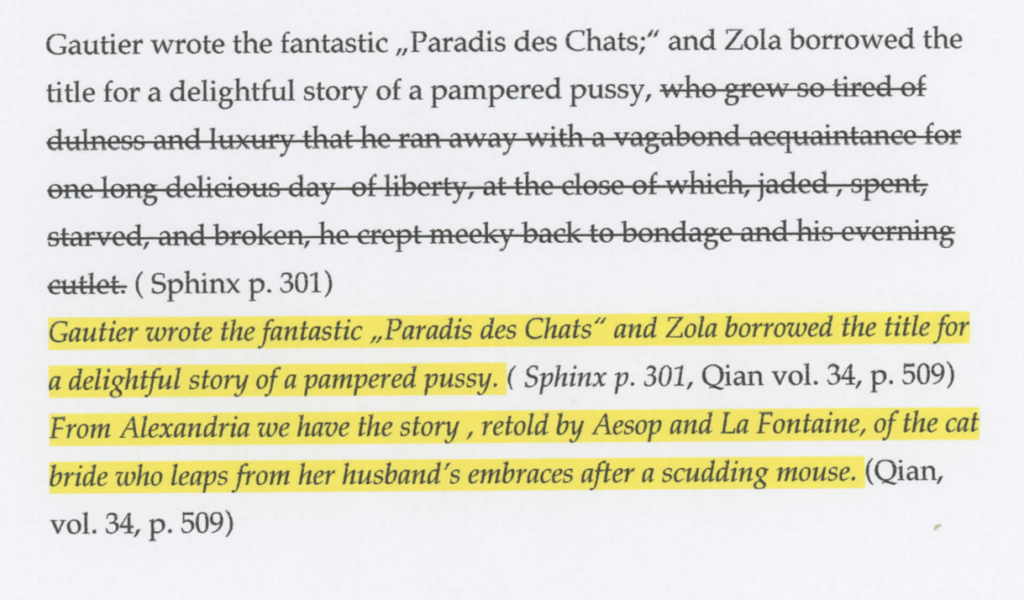
Figure 21: Qian creates a new ending
Combining two stories from Modern times as well as from Antiquity, Qian gives a last verdict on the character of the Cat: Independent, unreliable, with a love of freedom and liberty, and always mysterious. The whole text is less of an excerpt, but rather a creation by Qian himself.
Chop-Suey and Tablets of Memory
When we compare Qian’s quotations in the Notebooks with the original texts, there are many differences. The Notes are not a mere reference book for a future „History of the Western Canon of Literature“. After this great plan came to nothing, Qian did not discard or destroy his Notes. On the contrary, he went over them many times, typed them carefully and arranged them anew. Thus he made the Foreign Language Notes into a creative work of his own.
Qian was artist and scholar at the same time. The Notes do not only contain a stupendous amount of knowledge. They often give one the enjoyment of reading works of art. Their arrangement and style can be compared to the art of „Collage“, where for instance pictures, newspaper cuttings etc. are pasted on a canvas and made into something new.
Qian has used this form of writing in different guises in many other works. His novel Weicheng presents a galaxy of Chinese and Western quotations, which in the context of the novel gain a new meaning. In Guanzhuibian Qian has presented the canon of Chinese Literature in the mirror of Western culture, relying on innumerable quotations, interspersed with comments of his own.
Qian‘s „collage way“ of arguing has been criticized as giving the reader only incoherent fragments, instead of a logical system of thought. Other scholars like Zhang Longxi have held the opposite opinion, arguing that it is exactly this „fragmentary“ method, which is innovative and is worthwhile to study.[27]
In his essay „Laokoon“ Qian has compared culture to the ruins of a huge palace where little parts and pieces can still be saved and used in the future.[28] Actually there are lines of contact to modern art: Originally Ezra Pound wanted to let Chinese and Western concepts meet in a great „cosmos“, but at the end of his Cantos he confessed: „I cannot make it cohere“.[29] And a famous saying by T. S. Eliot at the end of his „Waste Land“ goes: „These fragments I have shored against my ruins.“
In Guanzhuibian Qian has added sparse comments to his quotations. In the Notes he goes a radical step further: Apart from the very early notebooks, he nearly completely abstained from any comments of his own. But he arranged his excerpts in a new way, which made them creations of his own.
Qian was conscious that he had created a new original method. In the Foreign Language Notes there is a section, complete with a full table of contents and paginated by Qian himself.[30] It has the appearance of a veritable book, and we might wonder whether Qian had planned to publish it some day. He has given this work two titles, „Chop-Suey“ and „Tablets of Memory“ (Figure 22). What do these titles mean?
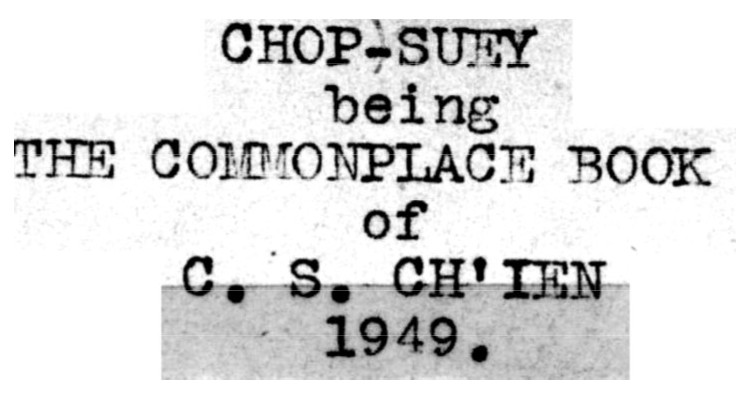
Figure 22a: Chop-Suey 
Figure 22b: Tablets of Memory
The first title reads: Chop-Suey, being the Commonplace Book of C. S. Ch’ien, 1949 (Figure 23). Chop-Suey is a Chinese – American dish, which consists of many left over bits of food, which are cooked together into a new dish. The Foreign Language Notes – Qian says jokingly – also consist of many bits and pieces, which are in a sense „left overs“ from whole works.

Figure 23: Chop-Suey, being the Commonplace Book of C. S. Ch’ien, 1949
The second title makes the sense still more clear: Tablets of Memory, being Extracts & Abstracts of Books by C. S. Ch’ien, 1949 (Figure 24). Qian uses not only the term „excerpts“, but also „abstracts“, which shows a greater freedom in relation to the original. As has been seen, Qian has often „tampered“ with the originals, has cut out and added passages and has arranged them in a new order. It is exactly this method which makes the Notes so inspiring to read.

Figure 24: Tablets of Memory, being Extracts & Abstracts of Books by C. S. Ch’ien, 1949
In Guanzhuibian little fragments of Chinese literature, philosophy, history, art, linguistics, life and customs are put into focus and saved for later generations. In the Foreign Language Notes Qian has used this method for discoveries in Western Culture. And that is the great Legacy of Qian Zhongshu. (Figure 25)
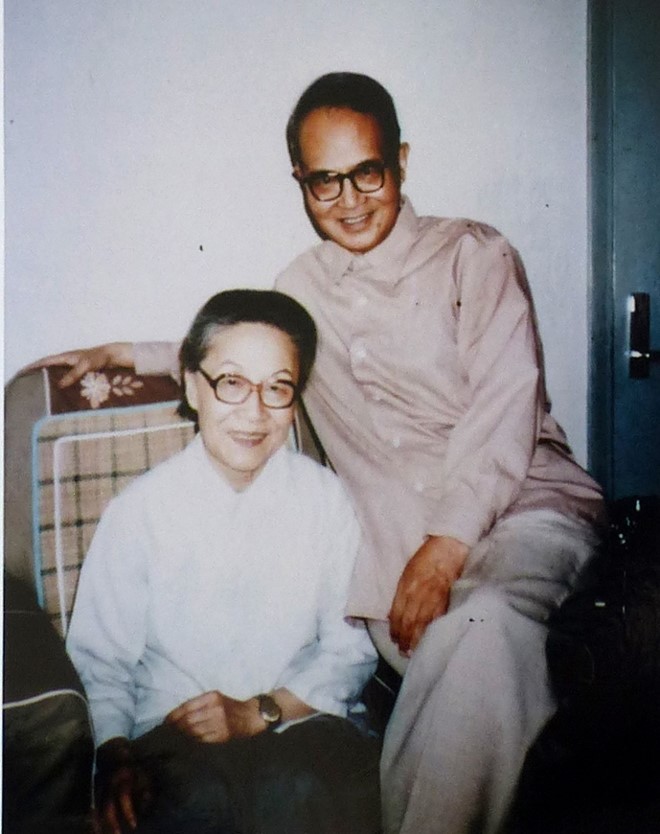
Figure 25:
[1] Manuscripts of Qian Zhongshu: Foreign Language Notes, 48 vols, one vol. index. With Forewords in Chinese, English and German, by Yang Jiang, The Commercial Press, Monika and Richard Motsch, Beijing: Commercial Press 2011 – 2015. 钱锺书手稿集:外文笔记,48册,加一册索引. 带杨绛,商务编辑部,莫芝宜佳和莫律祺的中文,英文,德文序,北京:商务印书馆 2011 - 2015年
[2] Notes, vol.1, p. 322 (Friedrich von Logau, Die Deutsche Sprache).
[3] Notes, vol. 36, p. 429 „Ich sehe nicht warum, da der Autor selbst nur 9 Monate im Mutterleib gelegen hat, ein Buch 9 Jahre im Pult liegen soll (G.–C. Lichtenbergs Aphorismen, hg Albert Leitzmann)
[4] Notes, vol 33, p.238 (Dialectic or the Tactics of Thinking, by Frank Binder)
[5] Notes, vol. 33, p. 89 (Marginal Comment by Harold Nicolson)
[6] Notes, vol. 36, p.430. (G. – C. Lichtenbergs Aphorismen, hg Albert Leitzmann)
[7] Notes, vol 33, p.161 (Essays Mainly on the Nineteenth Century. Presented to Sir Humphrey Milford)
[8] Notes, vol 37, p.41 (The Table Talk of John Selden, ed. S. W. Singer, revised W. S. W. Anson, George Routledge)
[9] Notes, vol. 34, p. 330 (H. V. Prochnow: The Public Speaker’s Treasure Chest)
[10] 二十五年二月起与杨约。。。Notes, vol. 1, p. 5
[11] 心同椰子。。。Notes, vol. 1, p. 201.
[12] vol.1, p.xxxvi
[13] Vol. 33, p.31: Lewis Melville, The Letters and Private Papers of W. M. Thackeray.
[14] Eothen by A.W. Kinglake. Printed in Poland by Amazon Fulfillment. Odin’s Library Classics. Editor Taylor Anderson. Preface to the First Edition by the Author.
[15] Excerpt Eothen 1: vol. 36, pp. 307 – 309
[16] 蒙马脱尔得‘跳蚤市场’和耶路撒冷圣庙的‘世界蚤虱大会’全像在这欧亚大旅社里举行。咬得体无完肤,抓得指无余力。“ (围城,第五章)。
[17] Excerpt Eothen 2, vol. 38, pp. 550-554.
[18] Eothen, p.120.
[19] Quote from Eothen, Ch. 20, p. 93.
[20] The Fireside Spinx, 1901, by Agnes Repplier, with Illustrations by E. Bonsall. The Riverside Press, Cambridge 1901. With a Foreword by the author. Scanned from the Cornell University Library’s print collections. Printed in Great Britain by Amazon.
[21] Notes, vol. 34, pp. 499 – 510.
[22] Sphinx, p. 69.
[23] Notes, vol. 34, p. 504.
[24] Sphinx, p. 181.
[25] Notes, vol 34, p. 508.
[26] Sphinx, p. 301 Notes, vol. 34, p, 509
[27] 张龙溪 argued: ”钱先生分条评点的写作方式 。。。对我们尤其能提供许多启迪,具有特殊的模范作用“. 中西交汇与钱锺书的治学方法, 钱锺书教授百岁纪念国际学术研讨会,2009年12月18/19日,中央大学文学院,Taiwan,International Conference in Centennial Commemoration of Professor Qian Zhongshu, The Humanity Center and college of Liberal Arts at NCU, Taiwan., p.1。
[28] „拉奥孔, 見“七缀集“, 钱锺书集, 北京:三联书店, 2001, pp. 38, 39.
[29] Ezra Pound, Canto CXVI: „And I am not a demigod/ I cannot make it cohere“. See Monika Motsch, Ezra Pound and China, Heidelberg 1976, p.169.
[30] Notes, vol 33, 159A.